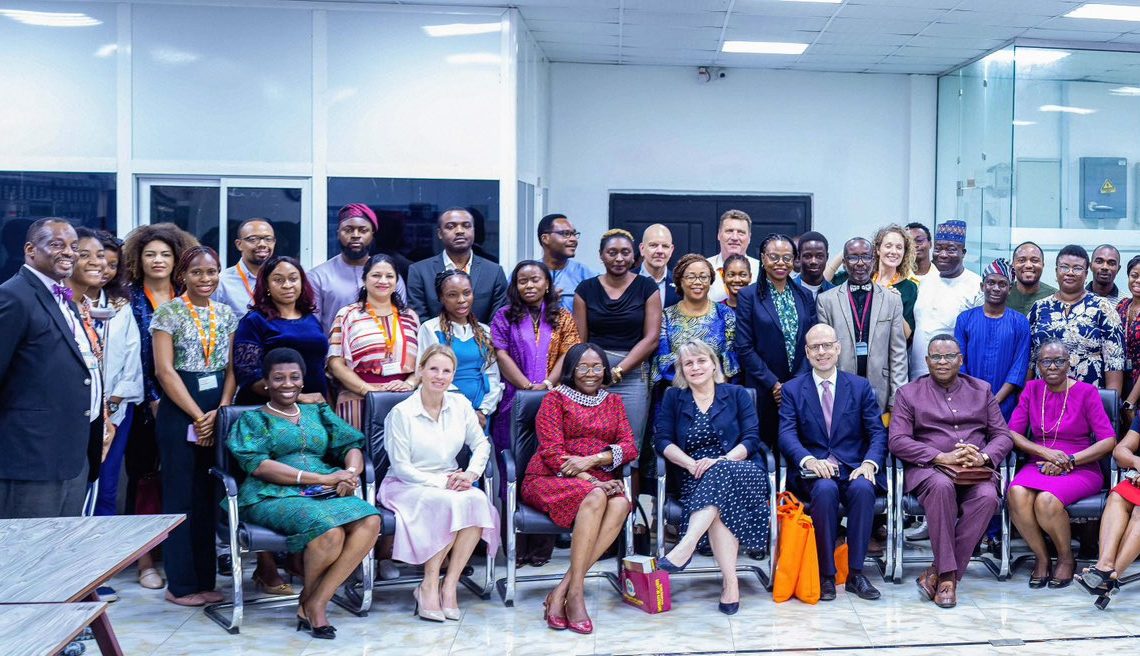Chukwuemeka Oguanuo (Lead writer)
Nigeria is the most populous country in Africa with over 200 million people — a number that is projected to more than double over the next 25–30 years, propelling it to become the world’s third most populous nation by 2050. This demographic increase, coupled with a healthcare market valued at approximately USD 18 billion, signifies substantial opportunities for both investors and healthcare organisations, as well as a crucial need for strategic investments in health, education, and human capital development.
The COVID-19 pandemic demonstrated that that a larger and healthier population translates into significant economic gains, with every $1 invested in health yielding economic returns ranging from $2 to $4. Given these facts, why isn’t healthcare positioned as the cornerstone for national development enabling Nigeria to reap its political, economic, and social gains while fostering a cohesive national identity?
Understanding the challenges in Nigeria’s healthcare sector
With the highest GDP in Africa, Nigeria has made steady, but slow progress in improving health outcomes, such as increased life expectancy and reduced infant mortality. Despite the substantial growth in the past two decades, driven by increased investments from both the public and private sectors, Nigeria’s healthcare sector still struggles to meet the nation’s escalating health needs. The Nigerian Government’s expenditure on healthcare per person has averaged around 4% over the past 20 years, reaching $84 in 2018 — considerably lower than countries with similar economies. This inadequate expenditure has resulted in the government not keeping pace with the population growth and healthcare demands, hindering its ability to achieve the World Health Organization’s Universal Health Coverage target.
In addition, Nigeria is reliant on importing health products, missing the opportunity to locally manufacture medical equipment, products, and consumables. This trend has exacerbated disparities in accessing quality healthcare, prompting those who can afford it to seek healthcare outside the country, contributing to Nigeria’s $1 billion medical tourism industry.
Recognising the urgency of the situation, President Bola Ahmed Tinubu prioritised healthcare as one of the pillars of his Renewed Hope Agenda for Nigeria. This resulted in the development of the health sector’s 4-Point Agenda, which is being spearheaded by the Coordinating Minister of Health and Social Welfare (CMHSW), Professor Muhammad Ali Pate. The Coordinating Minister of Health and Social Welfare is proposing a sector-wide approach that key stakeholders and partners are aligning with, pushing for a shared framework — to drive the much-needed reforms in the country’s healthcare sector.
Fostering strategic partnerships
To ensure that Nigeria’s healthcare sector receives the necessary support it requires for its population of over 200 million, the Federal Government is building strategic partnerships with the private sector, both within and outside the country’s borders. The Kingdom of Netherlands answered the request for strategic partnerships by engaging with life science and health (LSH) organisations located in the Netherlands. They organised a mission to Nigeria in February 2024 for these organisations to explore investment opportunities with healthcare counterparts in Nigeria.
Strategic matchmaking and knowledge exchange sessions were organised in Lagos and Abuja. While Nigeria’s $18 billion healthcare market and growing population provide numerous opportunities for significant economic and social impact returns, successful partnerships require a clear understanding of the market landscape, inherent opportunities and risks, an appreciation for relevant government policies, and stakeholder engagement strategies, according to PharmAccess Foundation’s 2022 report.
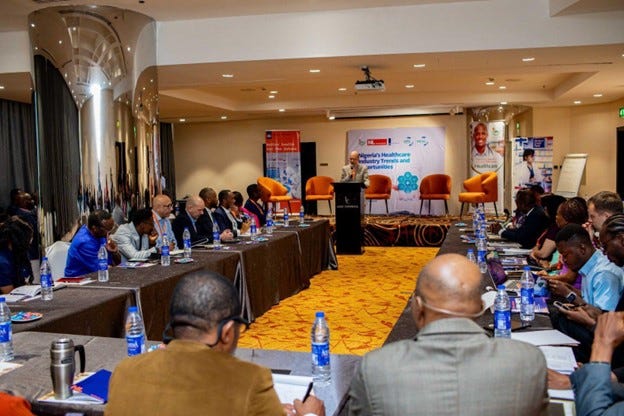
The Kingdom of Netherlands has maintained a longstanding partnership with Nigeria, nurturing a mutually beneficial relationship to advance both the national and global health security agenda. In 2015, the Dutch Consulate in Nigeria commissioned its first ‘Market Study Report’ on the Nigerian healthcare sector, carried out by PharmAccess Foundation, and updated in 2022 to inform the country’s healthcare investment strategies, resulting in a Memorandum of Understanding to strengthen economic and private sector bilateral relations across four strategic focus areas, including Life Sciences and Health. The predicted short- to medium term results in Nigeria’s health sector are well aligned with the Dutch Global Health Strategy and President Tinubu’s healthcare sector transformation agenda, of the Presidential Initiative for Unlocking the Healthcare Value Chain (PVAC).
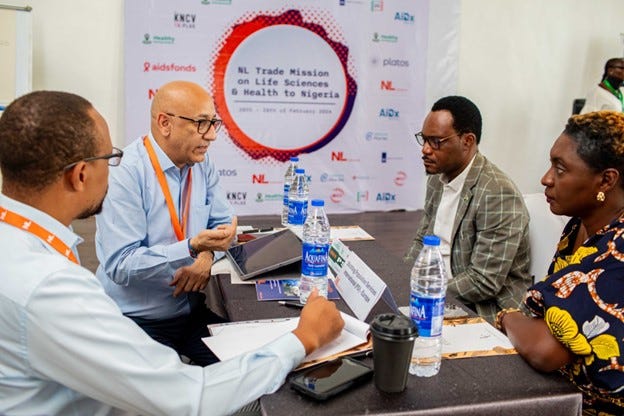
The Netherlands Health Mission to Nigeria, which was facilitated by the Nigerian Economic Summit Group (NESG), Healthcare Federation Network (HFN) and PharmAccess Foundation, saw Dutch LSH organisations form mutually beneficial connections with both public and private healthcare providers in the country. Among the highlights of the three-day visit was the signing of a Memorandum of Understanding between the National Blood Service Commission of Nigeria and Netherlands-based HemoClear B.V, which intends to implement a novel autologous (patient-owned) blood transfusion service in the country. Recognising the significant number of women who die each year in Sub-Saharan Africa from postpartum hemorrhage, the Coordinating Minister of Health highlighted that this strategic partnership will “boost synergy for blood value chain optimisation and increase blood supply quality and efficiencies.”
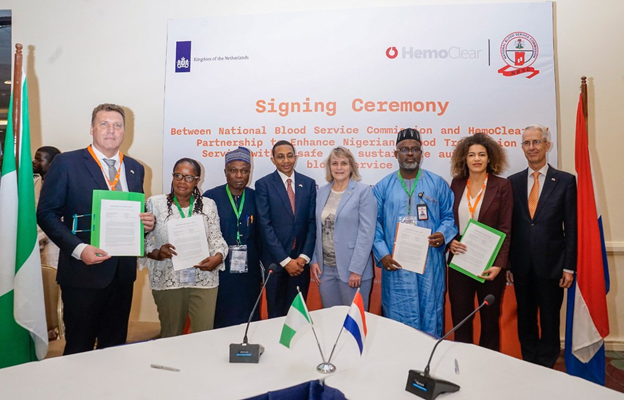
Opportunities within Nigeria’s healthcare value chain
Nigeria’s healthcare sector is facing the economic challenge of underfunding, which limits access to essential medical services, affects the quality of care, and exacerbates the burden of disease across the population. However, it has witnessed commitment from both public and private stakeholders determined to reshape its trajectory. This commitment was at the forefront of discussions during a high-level panel session organised by the Netherlands Embassy in Nigeria, as part of the Life Sciences & Health Mission and its partners, to explore potential inside Nigeria’s healthcare value chain. Dr. Abdu Mukhtar, National Coordinator of the Presidential Initiative for Unlocking the Healthcare Value Chain, emphasised the Federal Government of Nigeria’s commitment to transforming the health sector by boosting local production of health products and technologies, improving job quality and quantity in the healthcare value chain, and reducing medical tourism.
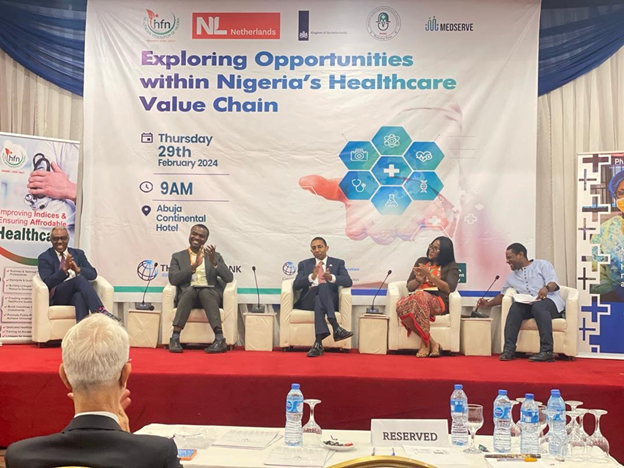
President Tinubu’s executive order further reinforces this commitment by addressing policy and regulatory frameworks that promote local manufacturing of medical consumables. These initiatives represent a promising step forward in leveraging the untapped opportunities within Nigeria’s healthcare value chain, not only paving the way for sustainable growth and development in the sector but, also creating an enabling environment for healthcare entrepreneurs to enter and thrive in the market.


